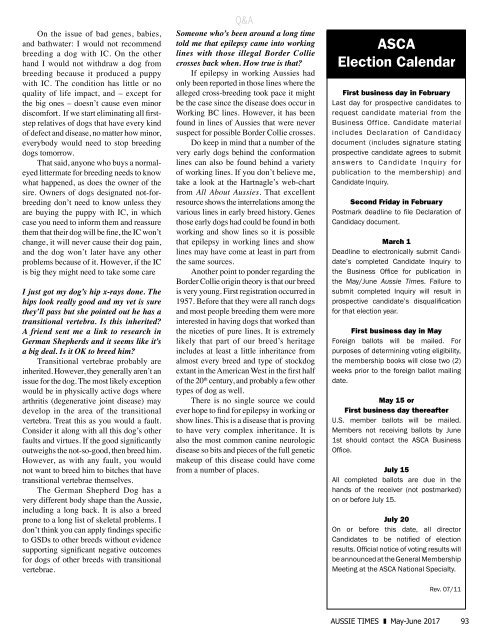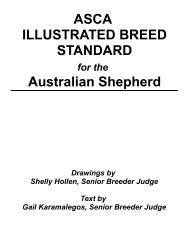You also want an ePaper? Increase the reach of your titles
YUMPU automatically turns print PDFs into web optimized ePapers that Google loves.
On the issue of bad genes, babies,<br />
and bathwater: I would not recommend<br />
breeding a dog with IC. On the other<br />
hand I would not withdraw a dog from<br />
breeding because it produced a puppy<br />
with IC. The condition has little or no<br />
quality of life impact, and – except for<br />
the big ones – doesn’t cause even minor<br />
discomfort. If we start eliminating all firststep<br />
relatives of dogs that have every kind<br />
of defect and disease, no matter how minor,<br />
everybody would need to stop breeding<br />
dogs tomorrow.<br />
That said, anyone who buys a normaleyed<br />
littermate for breeding needs to know<br />
what happened, as does the owner of the<br />
sire. Owners of dogs designated not-forbreeding<br />
don’t need to know unless they<br />
are buying the puppy with IC, in which<br />
case you need to inform them and reassure<br />
them that their dog will be fine, the IC won’t<br />
change, it will never cause their dog pain,<br />
and the dog won’t later have any other<br />
problems because of it. However, if the IC<br />
is big they might need to take some care<br />
I just got my dog’s hip x-rays done. The<br />
hips look really good and my vet is sure<br />
they’ll pass but she pointed out he has a<br />
transitional vertebra. Is this inherited?<br />
A friend sent me a link to research in<br />
German Shepherds and it seems like it’s<br />
a big deal. Is it OK to breed him?<br />
Transitional vertebrae probably are<br />
inherited. However, they generally aren’t an<br />
issue for the dog. The most likely exception<br />
would be in physically active dogs where<br />
arthritis (degenerative joint disease) may<br />
develop in the area of the transitional<br />
vertebra. Treat this as you would a fault.<br />
Consider it along with all this dog’s other<br />
faults and virtues. If the good significantly<br />
outweighs the not-so-good, then breed him.<br />
However, as with any fault, you would<br />
not want to breed him to bitches that have<br />
transitional vertebrae themselves.<br />
The German Shepherd Dog has a<br />
very different body shape than the Aussie,<br />
including a long back. It is also a breed<br />
prone to a long list of skeletal problems. I<br />
don’t think you can apply findings specific<br />
to GSDs to other breeds without evidence<br />
supporting significant negative outcomes<br />
for dogs of other breeds with transitional<br />
vertebrae.<br />
Q&A<br />
Someone who’s been around a long time<br />
told me that epilepsy came into working<br />
lines with those illegal Border Collie<br />
crosses back when. How true is that?<br />
If epilepsy in working Aussies had<br />
only been reported in those lines where the<br />
alleged cross-breeding took pace it might<br />
be the case since the disease does occur in<br />
Working BC lines. However, it has been<br />
found in lines of Aussies that were never<br />
suspect for possible Border Collie crosses.<br />
Do keep in mind that a number of the<br />
very early dogs behind the conformation<br />
lines can also be found behind a variety<br />
of working lines. If you don’t believe me,<br />
take a look at the Hartnagle’s web-chart<br />
from All About Aussies. That excellent<br />
resource shows the interrelations among the<br />
various lines in early breed history. Genes<br />
those early dogs had could be found in both<br />
working and show lines so it is possible<br />
that epilepsy in working lines and show<br />
lines may have come at least in part from<br />
the same sources.<br />
Another point to ponder regarding the<br />
Border Collie origin theory is that our breed<br />
is very young. First registration occurred in<br />
1957. Before that they were all ranch dogs<br />
and most people breeding them were more<br />
interested in having dogs that worked than<br />
the niceties of pure lines. It is extremely<br />
likely that part of our breed’s heritage<br />
includes at least a little inheritance from<br />
almost every breed and type of stockdog<br />
extant in the American West in the first half<br />
of the 20 th century, and probably a few other<br />
types of dog as well.<br />
There is no single source we could<br />
ever hope to find for epilepsy in working or<br />
show lines. This is a disease that is proving<br />
to have very complex inheritance. It is<br />
also the most common canine neurologic<br />
disease so bits and pieces of the full genetic<br />
makeup of this disease could have come<br />
from a number of places.<br />
ASCA<br />
Election Calendar<br />
First business day in February<br />
Last day for prospective candidates to<br />
request candidate material from the<br />
Business Office. Candidate material<br />
includes Declaration of Candidacy<br />
document (includes signature stating<br />
prospective candidate agrees to submit<br />
answers to Candidate Inquiry for<br />
publication to the membership) and<br />
Candidate Inquiry.<br />
Second Friday in February<br />
Postmark deadline to file Declaration of<br />
Candidacy document.<br />
March 1<br />
Deadline to electronically submit Candidate’s<br />
completed Candidate Inquiry to<br />
the Business Office for publication in<br />
the May/<strong>June</strong> Aussie Times. Failure to<br />
submit completed Inquiry will result in<br />
prospective candidate’s disqualification<br />
for that election year.<br />
First business day in May<br />
Foreign ballots will be mailed. For<br />
purposes of determining voting eligibility,<br />
the membership books will close two (2)<br />
weeks prior to the foreign ballot mailing<br />
date.<br />
May 15 or<br />
First business day thereafter<br />
U.S. member ballots will be mailed.<br />
Members not receiving ballots by <strong>June</strong><br />
1st should contact the ASCA Business<br />
Office.<br />
<strong>July</strong> 15<br />
All completed ballots are due in the<br />
hands of the receiver (not postmarked)<br />
on or before <strong>July</strong> 15.<br />
<strong>July</strong> 20<br />
On or before this date, all director<br />
Candidates to be notified of election<br />
results. Official notice of voting results will<br />
be announced at the General Membership<br />
Meeting at the ASCA National Specialty.<br />
Rev. 07/11<br />
AUSSIE TIMES May-<strong>June</strong> <strong>2017</strong> 93



